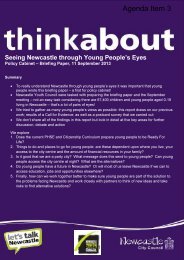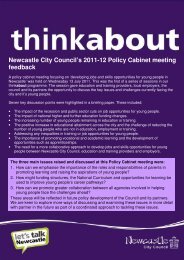NEWCASTLE'S MUSICAL HERITAGE AN INTRODUCTION By ...
NEWCASTLE'S MUSICAL HERITAGE AN INTRODUCTION By ...
NEWCASTLE'S MUSICAL HERITAGE AN INTRODUCTION By ...
You also want an ePaper? Increase the reach of your titles
YUMPU automatically turns print PDFs into web optimized ePapers that Google loves.
In 1892 the Newcastle upon Tyne Harmonic Society got off to a flourishing<br />
start in the Town Hall with a performance of the cantata ‘St John’s Eve’ (Cowan)<br />
and they ‘topped’ that the following year by getting Dr Joseph Parry to conduct<br />
the cantata, ‘Saul of Tarsus’, with special soloists. Parry is usually credited with<br />
heading the Renaissance in English music in his excellent literary choice and the<br />
way in which he set the subject to music. The Society’s annual concerts<br />
continued, somewhat erratically it seems, until the First World War, but from the<br />
programmes I have seen they were fairly ‘run of the mill’ affairs, although they did<br />
perform some works by contemporary English composers, which in some small<br />
way was a contribution to the revival of English music. Thirteen years earlier, in<br />
1879, Mr Albion Alderson (presumably of Alderson and Brentnall, musical<br />
instruments, record shop and concert booking agent late of Northumberland<br />
Street) formed what seems to have been a successful amateur choir. He<br />
conducted his choir in a series of Invitation and Private concerts in the Town Hall.<br />
From a note in one of his programmes he was also desirous of forming a small<br />
orchestra. Whether he realised his orchestra or not I am not able to say but his<br />
concerts presented works by Cowen, Schumann, Gade and Brahms. The<br />
performances remained somewhat exclusive with evening dress only and a note<br />
on the programme instructing the audience to arrange their carriages for 10.15<br />
pm.<br />
The General Post Office, my first employer, was a very musical organisation.<br />
Long before my time, in 1896, the vocal element formed themselves into the<br />
Postal and Telegraph Choral Society and according to contemporary press<br />
reports their programmes were always of interest. In 1911 the society reorganised<br />
its constitution and became known as the Newcastle Musical Union.<br />
Looking back across my Post Office years, I am conscious of a strong bias<br />
towards music amongst many of my colleagues. I worked alongside a violinist,<br />
who encouraged me to go to my first concert. I was on nodding terms with a<br />
trumpet playing postman, who played in various amateur orchestras and became<br />
very friendly with a more than competent pianist, whom I used to spend my lunch<br />
hour listening to whilst he practised his Chopin on a piano in the basement air<br />
raid shelter. (His father, a Newcastle man, had been a flute player with the<br />
Boston Symphony Orchestra in America.) I suspect also that my chief in the<br />
Head Office at St Nicholas’ had been an original member of the Musical Union.<br />
He would occasionally call me into his office, close the door and without warning,<br />
much to my embarrassment, burst into song – usually a bass ballad such as<br />
‘Rocked in the cradle of the deep’ or ‘In Cellar Cool’, ending on a low note that<br />
made me instinctively look down at his boots. As the last note was absorbed into<br />
the office carpet there would be a moments pause for appreciation, then he<br />
would clear his throat, and ask, “How’s that Joe”<br />
One of the most seriously committed of the many societies at this time was the<br />
Chamber Music Society formed in 1880. Even today it is mouth-watering to look<br />
through the societies programmes; chamber concerts for the connoisseur with<br />
64

















